Financial Markets
Research in this department centres on institutional changes in Europe’s financial markets. The department analyses the causes and consequences of banks’ international expansions, the link between market structures in banking and aggregate (financial) stability, contagion effects on international financial markets and the role of the financial system for the real economy.
The interdependence of the financial services sector with innovation and productivity in the real economy are of particular interest. Methodologically, research focuses on empirical methods that support analyses of feedback from the micro to the macro level and that allow for causal evaluations of regulatory interventions into financial systems.
IWH Research Seminar in Economics
FYI – Insights for Young Researchers in Finance
Your contact

- Department Financial Markets
Refereed Publications

Understanding CSR Champions: A Machine Learning Approach
in: Annals of Operations Research, forthcoming
Abstract
In this paper, we study champions of corporate social responsibility (CSR) performance among the U.S. publicly traded firms and their common characteristics by utilizing machine learning algorithms to identify predictors of firms’ CSR activity. We contribute to the CSR and leadership determinants literature by introducing the first comprehensive framework for analyzing the factors associated with corporate engagement with socially responsible behaviors by grouping all relevant predictors into four broad categories: corporate governance, managerial incentives, leadership, and firm characteristics. We find that strong corporate governance characteristics, as manifested in board member heterogeneity and managerial incentives, are the top predictors of CSR performance. Our results suggest policy implications for providing incentives and fostering characteristics conducive to firms “doing good.”

CEO Personality Traits and Compensation: Evidence from Investment Efficiency
in: Review of Quantitative Finance and Accounting, forthcoming
Abstract
<p>We examine the effects of the big five personalities of CEOs (openness, conscientiousness, extroversion, agreeableness, and neuroticism) on their annual compensation. We hand-collect the tweets of S&P 1500 CEOs and use IBM's Watson Personality Insights to measure their personalities. CEOs with high ratings of agreeableness and conscientiousness get more compensation. We further find that the firms with these CEOs outperform their peers due to better investment efficiency. Firms are willing to pay higher compensation for talent, especially for firms with better operations, located in states with higher labor unionization, or facing higher competition in the product market. Overall, CEO personality is a valid predictor of CEOs' compensation.</p>

Aggregate Dynamics with Sectoral Price Stickiness Heterogeneity and Aggregate Real Shocks
in: Journal of Money, Credit and Banking, forthcoming
Abstract
<p>This paper investigates the relationship between heterogeneity in sectoral price stickiness and the response of the economy to aggregate real shocks. We show that sectoral heterogeneity reduces inflation persistence for a constant average duration of price spells, and that inflation persistence can fall despite duration increases associated with increases in heterogeneity. We also find that sectoral heterogeneity reduces the persistence and volatility of interest rate and output gap for a constant price spells duration, while the qualitative impact on inflation volatility tends to be positive. A relevant policy implication is that neglecting price stickiness heterogeneity can impair the economic dynamics assessment.</p>
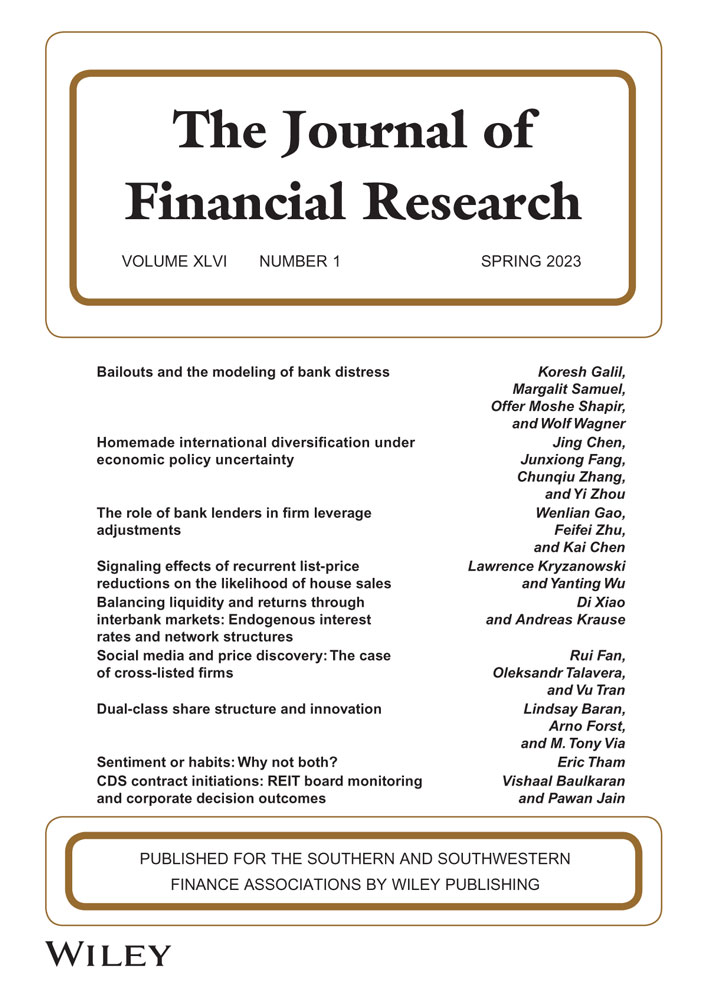
Social Connections and Information Leakage: Evidence from Target Stock Price Run-up in Takeovers
in: Journal of Financial Research, forthcoming
Abstract
<p>Does information leakage in a target's social networks increase its stock price prior to a merger announcement? Evidence reveals that a target with more social connections indeed experiences a higher pre-announcement price run-up. This effect does not exist during or after the merger announcement, or in windows ending two months before the announcement. It is more pronounced among targets with severe asymmetric information, and weaker when the information about the upcoming merger is publicly available prior to the announcement. It is also weaker in expedited deals such as tender offers.</p>

Deposit Competition and Mortgage Securitization
in: Journal of Money, Credit and Banking, forthcoming
Abstract
<p>We study how deposit competition affects a bank's decision to securitize mortgages. Exploiting the state-specific removal of deposit market caps across the U.S. as a source of competition, we find a 7.1 percentage point increase in the probability that banks securitize mortgage loans. This result is driven by an 11 basis point increase in deposit costs and corresponding reductions in banks' deposit holdings. Our results are strongest among banks that rely more on deposit funding. These findings highlight a hitherto undocumented and unintended regulatory cause that motivates banks to adopt the originate-to-distribute model.</p>
Working Papers
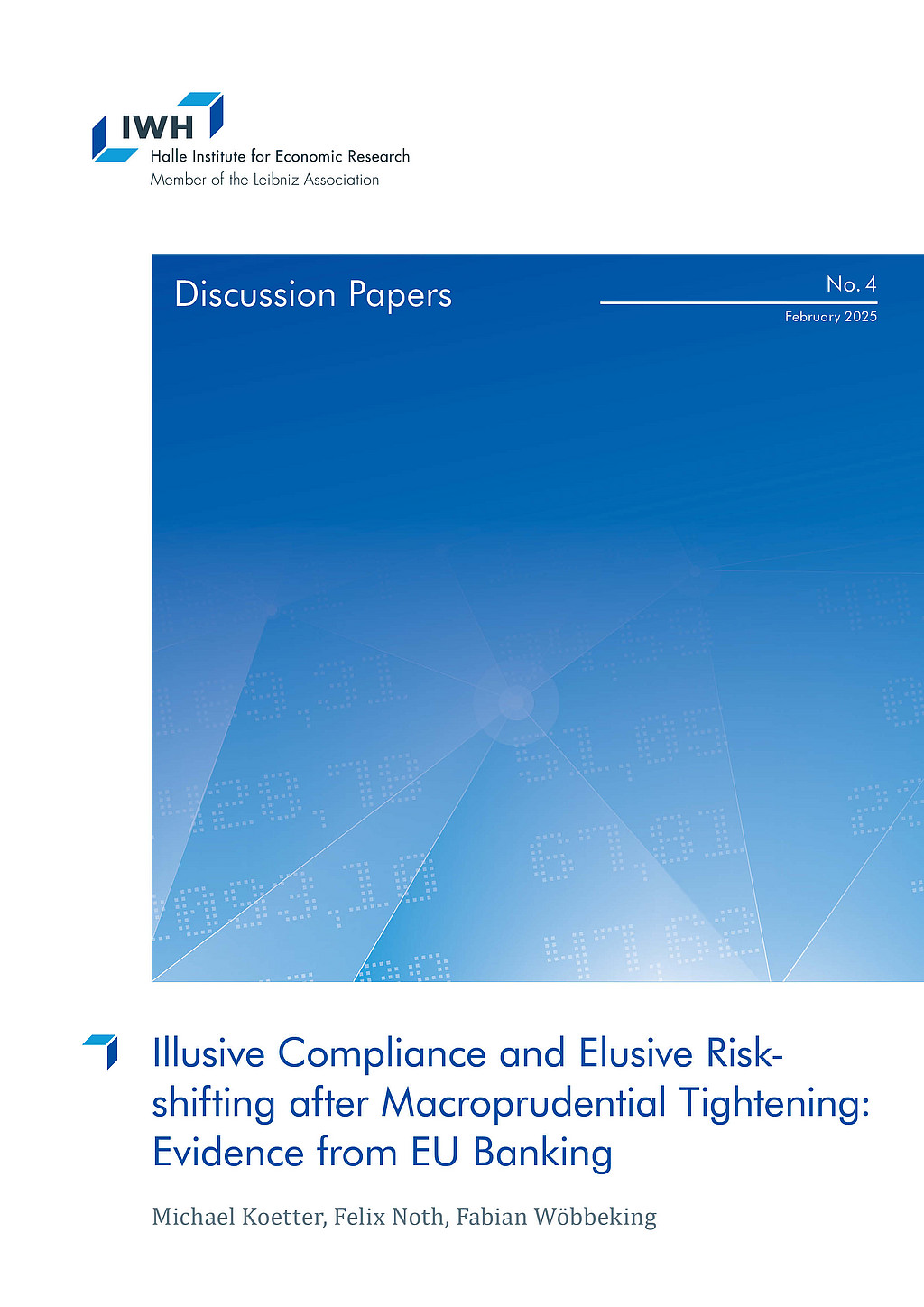
Illusive Compliance and Elusive Risk-shifting after Macroprudential Tightening: Evidence from EU Banking
in: IWH Discussion Papers, No. 4, 2025
Abstract
<p>We study whether and how EU banks comply with tighter macroprudential policy (MPP). Observing contractual details for more than one million securitized loans, we document an elusive risk-shifting response by EU banks in reaction to tighter loan-to-value (LTV) restrictions between 2009 and 2022. Our staggered difference-in-differences reveals that banks respond to these MPP measures at the portfolio level by issuing new loans after LTV shocks that are smaller, have shorter maturities, and show a higher collateral valuation while holding constant interest rates. Instead of contracting aggregate lending as intended by tighter MPP, banks increase the number and total volume of newly issued loans. Importantly, new loans finance especially properties in less liquid markets identified by a new European Real Estate Index (EREI), which we interpret as a novel, elusive form of risk-shifting.</p>
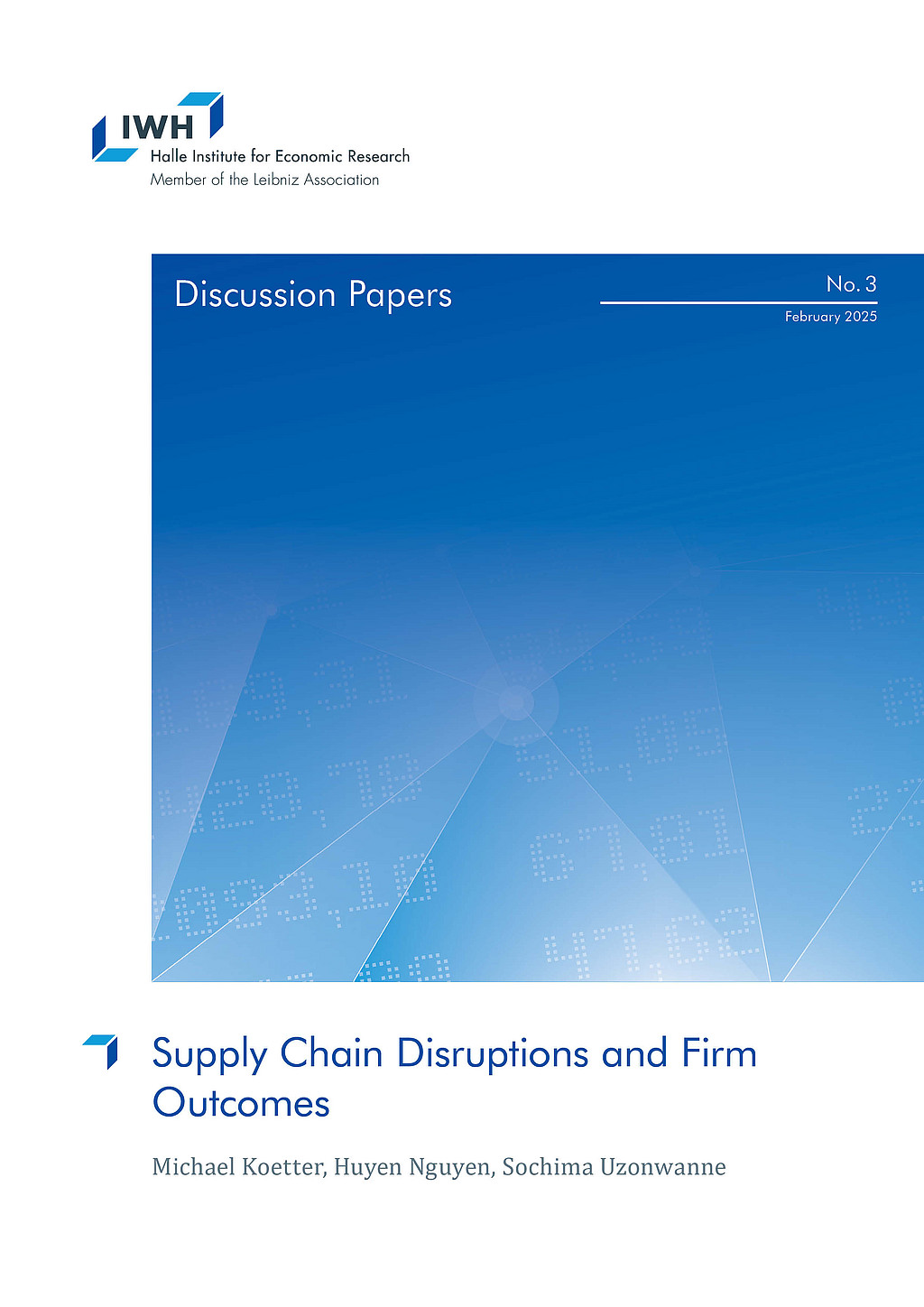
Supply Chain Disruptions and Firm Outcomes
in: IWH Discussion Papers, No. 3, 2025
Abstract
<p>This paper examines how firms’ exposure to supply chain disruptions (SCD) affects firm outcomes in the European Union (EU). Exploiting heterogeneous responses to workplace closures imposed by sourcing countries during the pandemic as a shock to SCD, we provide empirical evidence that firms in industries relying more heavily on foreign inputs experience a significant decline in sales compared to other firms. We document that external finance, particularly bank financing, plays a critical role in mitigating the effects of SCD. Furthermore, we highlight the unique importance of bank loans for small and solvent firms. Our findings also indicate that highly diversified firms and those sourcing inputs from less distant partners are less vulnerable to SCD.</p>

Ecological Preferences and the carbon Intensity of Corporate Investment
in: IWH Discussion Papers, No. 2, 2025
Abstract
<p>Lowering carbon intensity in manufacturing is necessary to transform current production technologies. We test if local agents’ preferences, revealed by vote shares for the Green party during local elections in Germany, relate to the carbon intensity of investments in production technologies. Our sample comprises all investment choices made by manufacturing establishments from 2005-2017. Our results suggest that ecological preferences correlate with significantly fewer carbon-intensive investment projects while investments stimulating growth and reducing carbon emissions increase by 14 percentage points. Both results are more distinct in federal states where the Green Party enjoys political power and local ecological preferences are high.</p>
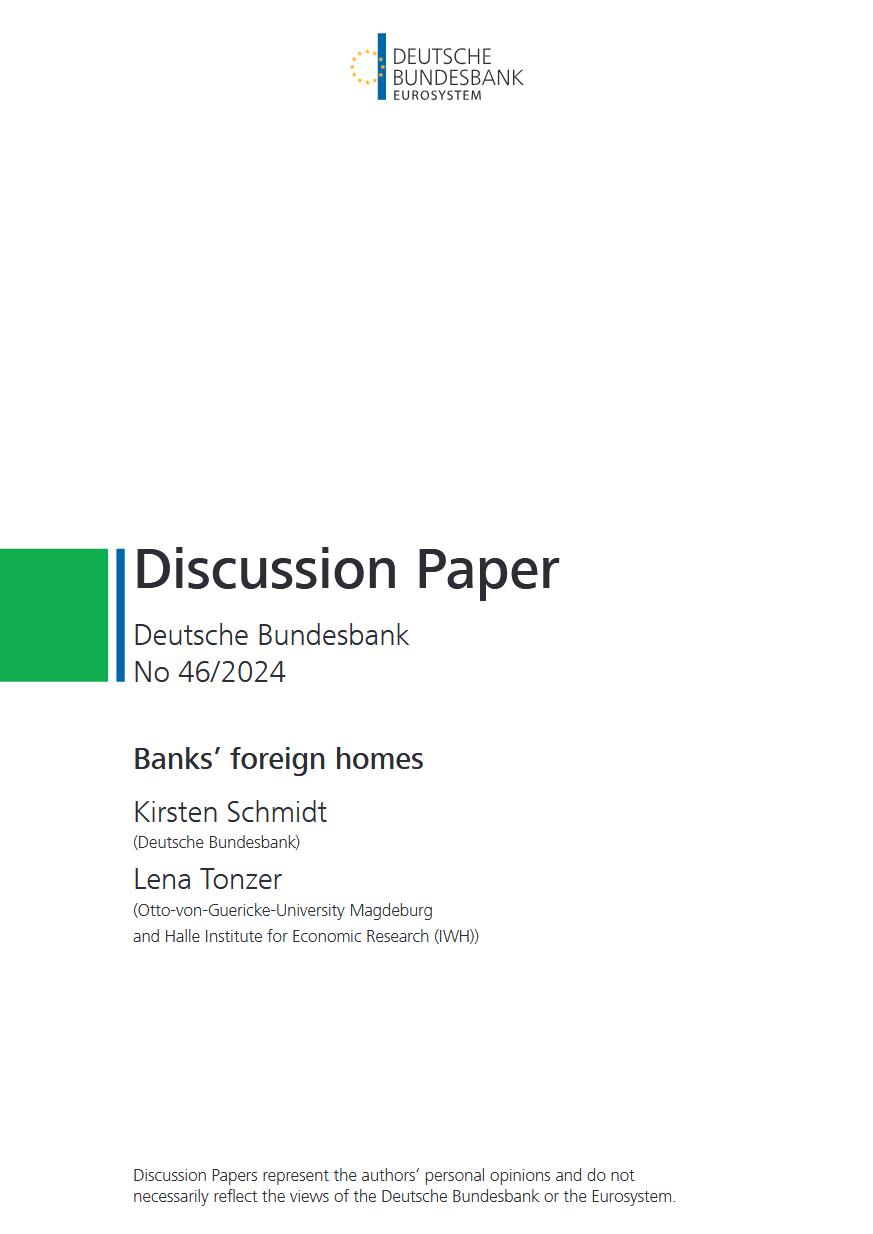
Banks’ foreign homes
in: Deutsche Bundesbank Discussion Papers, No. 46, 2024
Abstract
<p>Our results reveal that higher lending spreads between foreign and home markets redirect real estate backed lending towards foreign markets offering a higher interest rate, which provides evidence for "search for yield" behavior. This re-allocation is found especially for banks with more expertise on the foreign market due to a higher local activity and holds for commercial and residential real estate backed loans. Furthermore, "search for yield" behavior and a resulting increase in foreign real estate backed lending is found when macroprudential regulation is missing or misaligned between a bank’s country of residence and the destination country. When turning to the question of whether the detected search for yield behavior results in more risk, we find that especially better capitalized banks report higher forbearance ratios as they might face less stigma effects compared to low capitalized banks.</p>
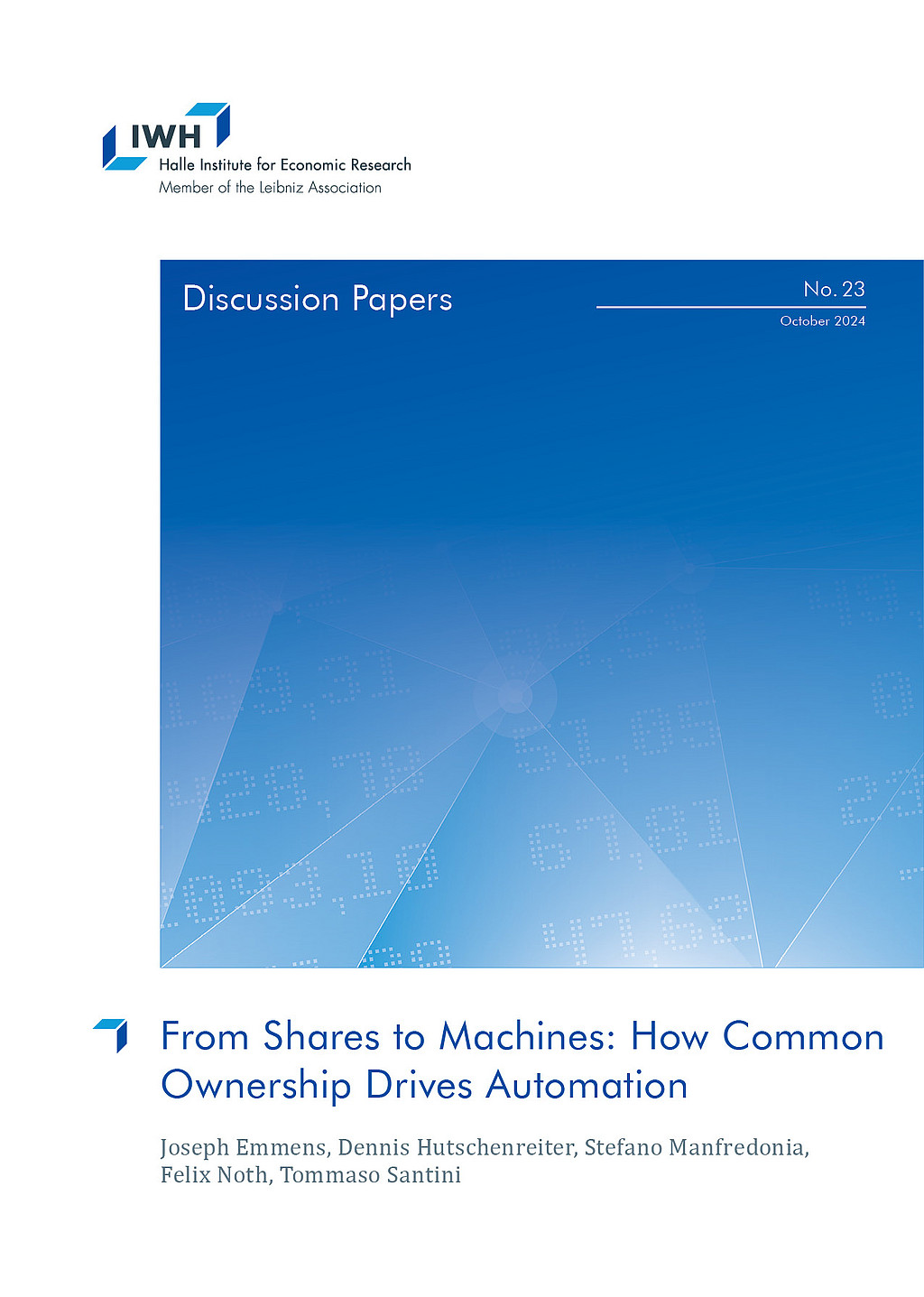
From Shares to Machines: How Common Ownership Drives Automation
in: IWH Discussion Papers, No. 23, 2024
read publication










































